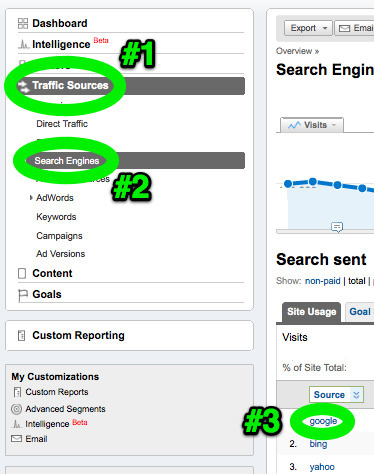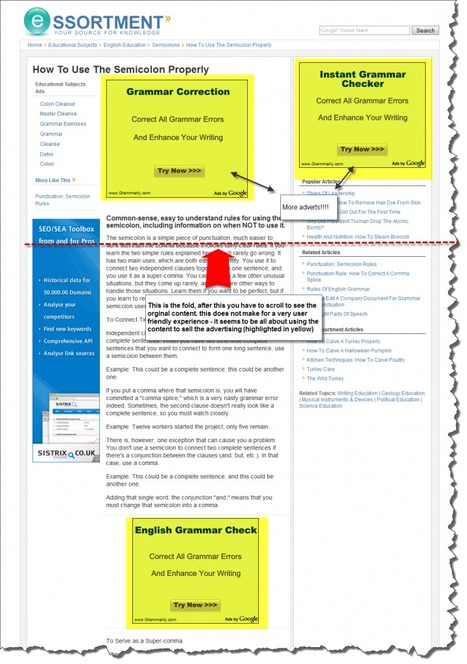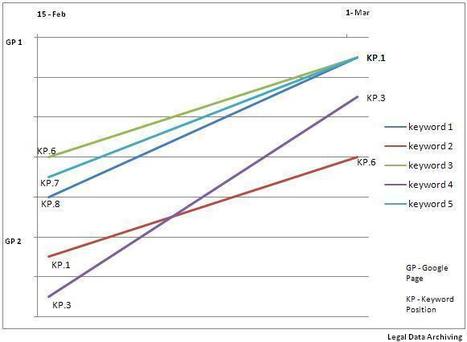 Your new post is loading...
 Your new post is loading...

|
Scooped by
Robin Good
April 13, 2011 8:26 AM
|
A number of prominent UK technology news sites have seen their Google rankings drop substantially after the search engine rolled out its "Panda" update, intended to demote sites which scrape content from others, to the UK and other English-language Google users.
The update also demotes one of the complainants to the European Commission, Microsoft-owned Ciao, which will almost vanish from many searches as a result of the downgrading.A number of prominent UK technology news sites have seen their Google rankings drop substantially after the search engine rolled out its "Panda" update, intended to demote sites which scrape content from others, to the UK and other English-language Google users.
The update also demotes one of the complainants to the European Commission, Microsoft-owned Ciao, which will almost vanish from many searches as a result of the downgrading.

|
Scooped by
Robin Good
April 13, 2011 8:24 AM
|
Many websites in the UK today are feeling the impact of Google's Panda update, one day after it was officially rolled out to all English-language Google users.
Much like the devastation unleashed on unsuspecting sites in the U.S. in February, today price comparison sites and many content sites (e.g., news, reviews, blogs) Google has deemed "shallow" have been hammered in the UK search results, according to preliminary data released today by Searchmetrics.
Searchmetrics bases their data on what they call an Organic Performance Index (OPI), which is calculated by looking at keyword search volume, position, and statistical value of traffic distribution. Their previous analysis in March analyzed data from 55 million domains, focusing on what they called "content farms" and "content heavy sites" sites.

|
Scooped by
Robin Good
April 12, 2011 2:08 AM
|
Late February, Google launched a substantial algorithm change (known as “Farmer” or “Panda”) aimed at identifying low-quality pages and sites. These are pages (often seen on so-called “content farms”) with text that is relevant for a query, but may not provide the best user experience. (Google calls it a “high quality sites algorithm.)
Today, Google has rolled this change out to all English language queries and made a few minor updates (with an estimated impacted to 2% of U.S. queries).

|
Scooped by
Robin Good
April 12, 2011 1:54 AM
|
Google said Monday that it has launched its so-called Farmer update internationally, a new algorithm designed to weed out low-quality content.

|
Scooped by
Robin Good
April 11, 2011 12:21 PM
|
Every couple of years the folks over at SEOmoz put together a list of search engine ranking factors. This year the results come from the opinions of 132 SEO professionals and an analysis of the top 30 results for over 10,000 different keywords.
While the full report has not been released some preliminary data has been made available via a presentation given at SMX Munich.
This presentation revealed some interesting changes from previous years so I’ve decided to summarize some of the major takeaways below.

|
Scooped by
Robin Good
April 10, 2011 5:49 AM
|
The "Farmer Update" is a change to Google's search engine ranking algorithm that took place on February 23, 2011.
Because it was an algorithmic change, that means Google didn't manually target, blacklist or otherwise tinker with the rankings of specific websites in search results.
Nor did the company specifically ban any sites from search results, though they may now appear significantly lower in search results than they did before the algorithm change.

|
Scooped by
Robin Good
April 9, 2011 7:11 AM
|
There is a WebmasterWorld thread with reports from some webmasters that they are seeing massive changes to the Google search results.
Typically posts like this mean that some are seeing test or early results on one of the many Google data centers. Sometimes that means that it is an early sign of a Google update.

|
Scooped by
Robin Good
April 6, 2011 11:53 AM
|
Bob Brooks rises from his seat to admit he's been lazy about ensuring toilet monsters and wine bras from his gift site, BaronBob.com, rank highly in organic Google search results for "funny gifts" and "unusual gifts."
"I got too comfortable," discloses the Maywood N.J. businessman.
Dani Horowitz admits her information technology forum relied too much on just one search engine, resulting in her unique U.S.visitors dropping from 90,000 to 15,000 a day on Feb. 28—when the Google algorithm most recently changed.

|
Scooped by
Robin Good
April 6, 2011 1:43 AM
|
Towards the end of February and the start of March this year there was a massive change to the Google algorithm over in the US. Initially called the Farmer update, the name was changed to Panda after Google announced that one of the engineers behind the update was called Panda!
At the time of writing it looks like the Panda update has still not gone live in the UK – although we are all waiting – but it is a good a time as any to look at what has happened in the US and how it may affect us here in the UK.

|
Scooped by
Robin Good
April 5, 2011 12:31 PM
|
Since the Panda update to Google, Wireless and Mobile News has experienced a decline in Google search traffic. We are not a content farm. All articles are new and edited by someone who teaches English.
Starting on February 25, Wireless and Mobile News fell off the face of Google. When we searched exact titles for articles we published, other websites showed up in the the top results, and sometimes Wireless and Mobile News did not show up at all.

|
Scooped by
Robin Good
April 1, 2011 6:20 AM
|
So this week, I was supposed to share the results from that 300% sales increase of that leather dog collar with nameplate example from last column, but this is a little more important.
Stock image from Shutterstock, used under license.
I was out of the country and out in the jungle the week the Google Panda/Farmer update hit. None of our sites or client sites were really affected, but that meant I had no real information on the direct effects of Panda other than what was reported in the press.
Less than 1% of Yahoo! Stores were impacted by the update, which makes sense because the update was aimed at content farms, not e-commerce sites.

|
Scooped by
Robin Good
April 4, 2011 1:58 AM
|
Recent changes to Google's search algorithm have sought to reduce the rankings of what Google has described as "low quality" and "low value add" sites. And while some of these websites have seen a significant drop in traffic, we may find that content farms aren't eradicated.
Rather, they're relocating. Impact Media's Mike Essex suggests their new destination may be e-books. On the Internet, many content farms are full of unoriginal content, often scraped from other sites, and republished under different headlines. The advent of easy self-publishing makes it incredibly simple for this process to be replicated in e-books....

|
Scooped by
Robin Good
April 1, 2011 1:13 PM
|
There are many sites suffering by the Google Farmer / Panda update and you'd think Google wouldn't want to pour salt on an open wound but some are experiencing just that.
A WebmasterWorld thread has some publishers complaining that the Google AdSense team is emailing publishers that their AdSense income is down. They are trying to find out what Google can do to help the publisher bring up their AdSense income to the levels before this update.
The thing is, the AdSense team doesn't realize that Google is the reason that these publishers have drastically lower AdSense income.
Google hit a ton of sites with this update and if they do not rank well, they do not make money for the publishers or Google.
Some feel these AdSense emails are insulting and downright hurtful.
|

|
Scooped by
Robin Good
April 13, 2011 8:25 AM
|
The Panda/Farmer algorithm update has been rolled out to English language regions as of Monday and a recent analysis reveals some UK sites have been hit. Let’s take a look at what sites have lost ground, but more specifically why.
By now we are all aware of the Panda algorithm update. If not, here’s a reminder; Google implemented the update over a month ago in the US. It was designed to detect sites with poor content and demote them within the SERPs rankings – therefore promoting others in their stead.
Source: Google’s Panda Algorithm Update: What sites were hit and why?

|
Scooped by
Robin Good
April 12, 2011 2:11 AM
|
As first reported by Danny Sullivan at Search Engine Land, Google has launched a major update to their algorithm to combat content farms. Google publicly stated that the update affects 11.8 percent of their search queries.
From a rank tracking perspective, the timing of the update is perfect for Raven users. The change started to occur right after our weekly SERPs update, which means you should see the full impact of Google’s change as early as February 28 and no later than March 2

|
Scooped by
Robin Good
April 12, 2011 2:07 AM
|
Over a month ago we introduced an algorithmic improvement designed to help people find more high-quality sites in search.
Since then we’ve gotten a lot of positive responses about the change: searchers are finding better results, and many great publishers are getting more traffic.
Today we’ve rolled out this improvement globally to all English-language Google users, and we’ve also incorporated new user feedback signals to help people find better search results.
In some high-confidence situations, we are beginning to incorporate data about the sites that users block into our algorithms.

|
Scooped by
Robin Good
April 12, 2011 2:10 AM
|
...It has definitely hit the UK, my sites have been hit pretty hard -80% in the last couple of hours...

|
Scooped by
Robin Good
April 11, 2011 1:57 AM
|
One thing with this farmer/panda Google update that seems to be impacting a lot of sites, is that there are many examples of sites producing original content and other sites taking their content and outranking them...

|
Scooped by
Robin Good
April 9, 2011 7:11 AM
|
NEW YORK — Google has tweaked the formulas steering its Internet search engine to take the rubbish out of its results. The overhaul is designed to lower the rankings of what Google deems "low-quality" sites.

|
Scooped by
Robin Good
April 7, 2011 6:35 AM
|
A WebmasterWorld thread asks a very nice question... Can you detect if you have a penalty by using Google's custom search engine feature.
Basically, you create a new search engine with it and then compare the results on Google.com with your own new Google CSE. If your site comes up high in the Google CSE and low in the Google web results, then maybe you have a penalty that does not impact the Google CSEs?

|
Scooped by
Robin Good
April 6, 2011 11:52 AM
|
I just read a blog post by Joe Pulizzi at Junta42 Content Marketing about content curation. It got me thinking. His claim – first articulated by Rohit Bhargava in 2009 — is that, as more companies develop a content marketing strategy, a new role is emerging for a content curator, defined as:
Someone whose job it is not to create more content, but to make sense of all the content that others are creating. To find the best and most relevant content and bring it forward.

|
Scooped by
Robin Good
April 6, 2011 1:23 AM
|
Around February 24, 2011, Google made a major announcement - It said,"In the last day or so we launched a pretty big alogorithmic improvement to our ranking - a change that noticeably impacts 11.8% of our queries." "This update is designed to reduce rankings for low quality sites - sites which are low-value add for users, copy content from other websites or sites that are just not very useful.
At the same time, it will provide better rankings for high quality sites-sites with original content and information such as research, in-depth reports, thoughtful analysis and so on.
We can't make a major improvement without affecting rankings for many sites. It has to be that some sites will go up and some will go down. Google depends on the high-quality content created by wonderful websites around the world, and we do have a responsibility to encourage a healthy web ecosystem. Therefore, it is important for high-quality sites to be rewarded, and that's exactly what this change does."

|
Scooped by
Robin Good
April 5, 2011 4:18 AM
|
Since the advent of the Panda update (aka Farmer) people have been scrambling to understand what happened, and how to move forward. Vanessa Fox has provided some great info on Panda as well as the latest on Panda from SMX West. I decided to dig a bit into some of the data on the winners and losers.
My particular focus was on social engagement metrics. To get access to this data on other sites I made use of the Pro level service from Compete.com. This allows me to look at metrics such as time on site, pages per visit, and visits per person.
Unfortunately, bounce rate was not available, but these still felt like three pretty good metrics to examine. I also decided to look at some of the larger content farms to see what the story was with them.
Here is the raw data:

|
Scooped by
Robin Good
April 4, 2011 11:13 AM
|
It’s ironic that so many people in the SEO community are scratching their heads over Google’s Panda update and yet if you search you’ll find a variety of Websites offering all sorts of advice on how to recover from Panda, how to prepare for Panda outside the U.S. search market, and how to figure out if you were affected by the Panda update.
Here’s the easy part: Check your U.S. Google referral traffic for the week of February 20-7 and if you lost traffic that hasn’t returned since, you were probably affected by the Big Panda.

|
Scooped by
Robin Good
April 1, 2011 1:11 PM
|
Google regularly adjusts its search function – the algorithm programming that determines what you find when you search for something. These algorithm changes are almost never noticed; the February 2011 change, though, devastated some websites' rankings – and thus their traffic.
The change was made to reduce the high rankings of content farms on the search engine result pages (SERPs) and to move sites with quality content up in the rankings. And it worked.
Why Did Google Do This?
In short: user feedback. Customers complained that sites with poor quality content ranked too high on Google pages. Content farms such as Associated Content, Wisegeek.com, and Mahalo.com were targeted for ranking reductions, and they took big hits. Companies with websites that "gamed" Google (and were good at it) ranked high, and Google fixed that.
The plan was to reduce the rankings of sites with duplicate content and low quality content – those with a low ratio of content to ads, and those that were identified with "poor user experience."
|



 Your new post is loading...
Your new post is loading...


























